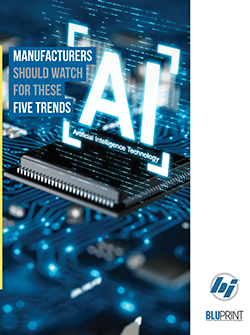

Over the last several years trends have emerged in manufacturing, realising significant advancements in machine-reliant assembly lines through to highly automated factories. As we look ahead, there are several key trends to watch.
Smart factory adoption
Smart factories have gained momentum in recent years, as more manufacturers realise the benefits of automating their facilities. They are characterised by their use of advanced technologies such as data analytics, machine learning, and artificial intelligence to optimise operations and increase efficiency. By leveraging these technologies, manufacturers can reduce costs, improve quality control and streamline processes, leading to greater profitability and competitiveness.
To transition to a smart factory, companies must invest in a range of technologies and capabilities. Cloud-powered smart capabilities, for instance, are essential for storing and processing the vast amounts of data generated by smart equipment. Global template-based manufacturing execution systems enable manufacturers to manage and optimise production processes across multiple sites, while IIoT provides the connectivity needed for smart devices and equipment to communicate and share data.
Achieving a truly smart factory requires the integration of operational technology and information technology, and also robust security measures to protect against cyber threats. By connecting these systems, manufacturers can create a seamless flow of data between equipment, machines and human operators, enabling real-time decision-making and process optimisation.
With the adoption of smart technologies, manufacturers can achieve predictable inventory requirements, minimise process variability, and optimise performance across their operations. In addition, the use of automation and self-configuring operations can help to minimise the need for manual labour, further reducing costs and improving efficiency. As we move further into 2024, it is likely that we will see even more manufacturers adopting smart technologies.
Sustainability and carbon neutrality
Sustainability is a major focus, as more companies seek to reduce their carbon footprint and become more environmentally responsible. In addition to regulatory requirements, many customers are now demanding sustainable processes and products from their suppliers.
Supply chain reassessment
Manufacturers are still grappling with persistent bottlenecks in transportation, raw materials and production. These challenges have made it difficult for supply chain leaders to plan and execute their operations effectively, as they must contend with unreliable transportation, parts and product shortages, uncertain customer demand, and logistical challenges in designing and planning new supply chain models.
To address these issues, supply chain reassessment will continue to be a prominent trend. While data-driven inventory management is an effective way to identify previously unknown supply chain deficiencies, disruption and uncertainty will still be prevalent as organisations work to improve their logistics and supply networks.
Digital solutions are crucial to ensuring that product availability and customer experience are intact. As a result, there will be significant technological investments in supply chain technologies and logistics jobs in the coming year. However, not all operations can be entirely digitised, especially within smaller organisations. While the risk of supply chain disruptions can be reduced through technology, small businesses can optimise their supply chain by accurately forecasting demand, finding alternative and secondary suppliers to deepen their vendor base, and outsourcing logistics to a third-party logistics provider.
Safety and health measures
Employee safety and health remain a top priority for manufacturers today. Companies are implementing various measures to monitor and maintain the health of their employees. They should plan to be compliant with worker safety regulations, and anticipate potential inspections. Non-compliance with regulatory standards can have severe consequences, including costly fines and reputational damage. By prioritising employee safety and compliance, manufacturers can not only protect their workers, but also avoid the risk of legal penalties and business disruptions.
Dark factory adoption
The manufacturing industry has seen significant advances in recent years, driven in large part by the growing adoption of virtual processes and technologies. Digital twins, machine learning, artificial intelligence, augmented reality, and virtual reality are just a few examples of the powerful tools that are transforming the industry.
In 2024, we can expect to see these technologies become even more prominent, This trend is paving the way for the development of dark factories that can function with minimal human intervention, and even in complete darkness. Dark factories are no longer a futuristic concept; they are becoming increasingly common in modern manufacturing.
With the help of advanced digital solutions, machines can now operate autonomously, with minimal human input. This not only increases efficiency and productivity, but also reduces a factory’s carbon footprint. While heavy industries such as steel mills and forge companies may still require some manual labour, many other manufacturing processes can now be fully automated.
To view the full report visit www.instrumentation.co.za/ex/brennan.pdf
Courtesy of Brennan, www.brennaninc.com

© Technews Publishing (Pty) Ltd | All Rights Reserved